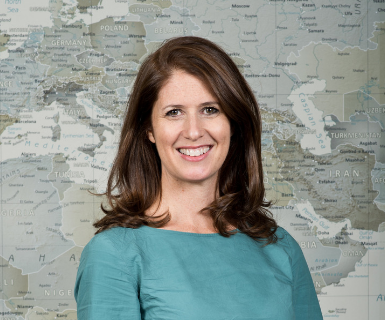By Robin Lerner, President and CEO, Texas International Education Consortium
 My nearly 20 years in public diplomacy have shown me that a country’s public diplomacy engagement is driven by its culture and aligned to what its society intrinsically values. I learned this firsthand in Baghdad in 2004 as I witnessed U.S. embassy staff brave public bombings and kidnappings to deliver books to schools and universities. I have never forgotten that U.S. commitment to feeding the hungry minds of a population cut off from free and free-flowing information. It’s true that if we try to compete with France on cultural engagement, we may not win. But try to compete with the U.S. on engagement around civics, civil society, and freedom of speech, and you will meet a formidable foe.
My nearly 20 years in public diplomacy have shown me that a country’s public diplomacy engagement is driven by its culture and aligned to what its society intrinsically values. I learned this firsthand in Baghdad in 2004 as I witnessed U.S. embassy staff brave public bombings and kidnappings to deliver books to schools and universities. I have never forgotten that U.S. commitment to feeding the hungry minds of a population cut off from free and free-flowing information. It’s true that if we try to compete with France on cultural engagement, we may not win. But try to compete with the U.S. on engagement around civics, civil society, and freedom of speech, and you will meet a formidable foe.
Why does this matter? Being aware of who we are allows us to engage our strongest assets – the people and organizations that make up our civil society and democratic systems. This is not a new concept – we have programs designed specifically to bring individual Americans into our public diplomacy – but as we consider the special moment in which we find our country, is it enough? The answer likely lies in how little most Americans know about public diplomacy and the opportunities that exist for them to participate.
The moment is now to go big or go home and make some changes. American civil society has captivated the world consistently over the past six months – all of our messy self-expression on display as we grapple with significant societal fractures. For good or bad, this country was built by the activism and ingenuity of its people, and that’s the story we must explain. Who best to do so than those diverse change-agents and local innovators that don’t normally find themselves on U.S Department of State programs. Let’s make a new goal that for every project implemented by a Washington-based organization, we fund two first-time, geographically-diverse grantees. Perhaps, an association of small-town mayors, a network of sustainable fashion entrepreneurs, or a Hispanic chamber of commerce. How do we do this? We tap into networks who have networks – Global Ties U.S., the World Affairs Councils of America, the League of Women Voters, YMCA/YWCA, state-based university consortia – to build new grantee capacity, and create a platform for ideas and volunteers. Let’s make public diplomacy about the American public and set a goal to double the number of organizations on U.S. Department of State-led public diplomacy programs. This effort will pay off in dividends simply in the number of people with an affinity for the U.S. Department of State and public diplomacy specifically.
Underpinned by the Global Ties Network and other international exchange-focused organizations, let’s engage our fellow Americans in communicating to the world how, in the face of deep divisions and disagreements, our country manages to transition government peacefully, send rockets into space, and create vaccines in record-breaking time. By involving us all, we are sharing what is most intrinsic to our culture and, in turn, creating an understanding of what public diplomacy is and does for this country – a true win-win.
